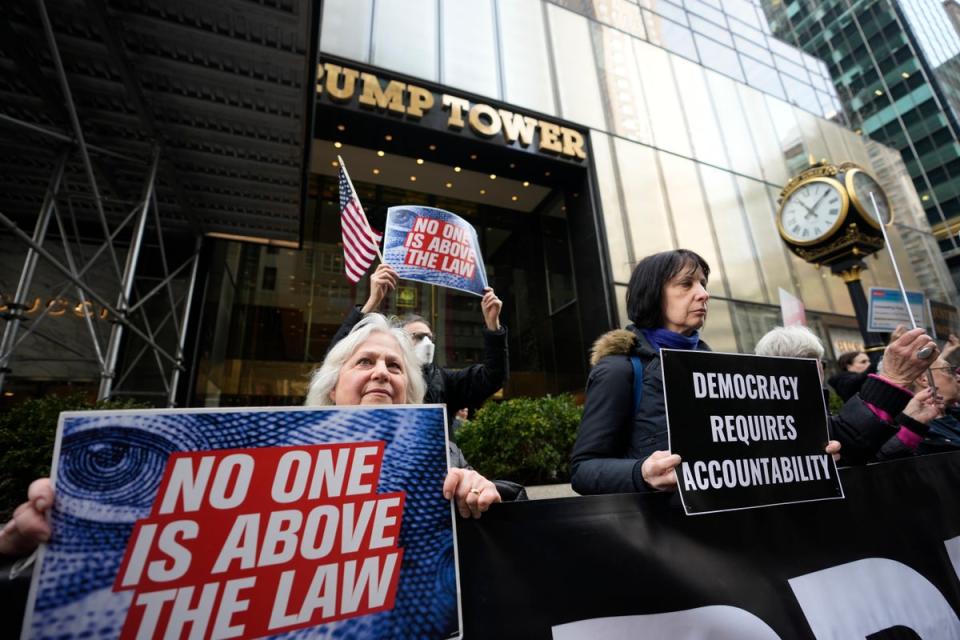Will Letitia James seize Trump Tower? Ex-president is running out of time to pay $464m bond
- Oops!Something went wrong.Please try again later.
- Oops!Something went wrong.Please try again later.
Lawyers for Donald Trump notified an appeals court this week that their client has failed to secure a bond to satisfy the $464m civil fraud judgment levelled against him by a New York court, saying finding a company to back such a large amount of money was proving a “practical impossibility”.
Mr Trump has hotly objected to a “fire sale” of his property empire – selling off assets to generate cash to meet the bond – but failing to do so risks allowing such prized properties as Trump Tower in Manhattan, so integral to his brand, to fall into the hands of New York attorney general Letitia James, who has already said she is more than happy to repossess his holdings.
The former president and current presumptive Republican presidential nominee has approached “about 30 surety companies through four separate brokers”, his attorneys said, but had so far come back empty-handed in the face of “insurmountable difficulties”.
“Critical among these challenges is not just the inability and reluctance of the vast majority of sureties to underwrite a bond for this unprecedented sum, but, even more significantly, the unwillingness of every surety bond provider approached by defendants to accept real estate as collateral,” his attorneys wrote.
The companies approached “will only accept cash or cash equivalents” such as marketable securities, they said, and would typically “require collateral of approximately 120 per cent of the amount of the judgment,” which, in this case, comes to almost $560m.
Sureties would then in all probability charge bond premiums of approximately 2 per cent per year “with two years in advance – an upfront cost over $18m,” according to the attorneys.
That money would not be recoverable even if Mr Trump were to ultimately succeed in overturning the judgment against him.
As it stands, the luxury property tycoon turned populist politician has until Monday 25 March to find the money if he wishes to appeal Judge Arthur Engoron’s ruling last month that he must pay around $355m in fines and a further $100m plus in interest after being found guilty by a jury of misrepresenting the value of Trump Organization assets between 2011 and 2021 to obtain favourable loans from banks and insurers.
With interest ticking ever-upwards at 9 per cent or $120,000 a day, the exact total he owes at the time of writing (Wednesday 20 March), according to the helpful Trump Debt Counter website, is $467.6m.
The case was brought against the 45th president and his fellow executives in 2022 by New York attorney general Letitia James, whose office has since asked the appeals court to reject Mr Trump’s latest protestations.
In a court filing submitted on 20 March, Ms James argued that the court should dismiss the defendant’s complaints about being unable to meet his bond requirement as they are “procedurally improper”, saying he had had ample time to raise his objections beforehand.
She added that the Trump camp’s claims “boil down to the proposition that sureties have been unwilling to accept Mr Trump’s real estate holdings as collateral” but that the defendants had failed to supply “documentary evidence that demonstrates precisely what real property they offered to sureties, on what terms that property was offered, or precisely why the sureties were unwilling to accept the assets”.

Ms James further argued that, even if the court were to accept Mr Trump’s argument that real estate is difficult for a surety to accept as collateral for a bond, they had failed to suggest a serious alternative.
“If he does not have funds to pay off the judgement, then we will seek judgment enforcement mechanisms in court and we will ask the judge to seize his assets,” she told ABC News recently.
“We are prepared to make sure that the judgement is paid to New Yorkers, and yes, I look at 40 Wall Street each and every day.”
It appears that Ms James’s office has already started taking steps toward recovering some of the former president’s assets — but not in Manhattan.
Filings dated 7 March revealed that state attorneys have entered the judgment from the Manhattan civil fraud trial with the county clerk’s office in New York’s Westchester County — home to the former president’s Seven Springs estate and his Trump National Golf Club Westchester. Entering a judgment indicates that her office is beginning the process of taking possession of Mr Trump’s properties.
Since the civil fraud trial took place in Manhattan, where Trump Tower and 40 Wall Street are located, a judgement there has already been entered. Massive outstanding loans on those properties, though, mean they are unlikely to be among the most at risk of being seized.
Mr Trump was able to secure a $91.6m bond earlier this month enabling him to appeal the defamation verdict against him in the E Jean Carroll case through the Federal Insurance Company, a subsidiary of the Chubb Corporation, whose CEO was appointed to a trade advisory committee during the Trump administration.
However, the same company does not appear to be prepared to support him this time around.

On 20 March, The New York Post quoted Trump insiders as saying that the former president may be inclined to simply “do nothing” rather than continue to scramble to raise the money from companies, wealthy friends or donors or file for Chapter 11 bankruptcy, which would in any case not rid him of debts accrued through fraud and definitively undermine his claims to be a billionaire businessman and therefore, potentially, his electoral appeal.
Assuming his legal team cannot secure a pause in the enforcement of the financial portion of the judgment in the meantime, allowing the 25 March deadline to pass would enable Ms James to seize his bank accounts and real estate assets, including Trump Tower – whose golden escalator he famously sailed down in June 2015 to announce his initial presidential run – and leave Mr Trump to gamble on his being able to recover his possessions later via an appeal to the US Supreme Court.
“Even if there is a taking, it doesn’t mean he can’t take it back later,” the Trump source told the newspaper.
The Post also quotes another of the former president’s allies who says the candidate believes he has a strong case for overturning the fraud decision against him because “it will have a chilling effect on people who do business in New York because it could happen to anyone.”
They continue: “There will be severe consequences – not an insurrection. People will stop doing business in New York. No one will take the risk, and lenders are now spooked.
“The real estate market is already a disaster, with office buildings worth a fraction of what they were once worth, and there are metastasizing effects when a large part of the city’s budget is from real estate.”
Time will tell. And the clock is ticking.

